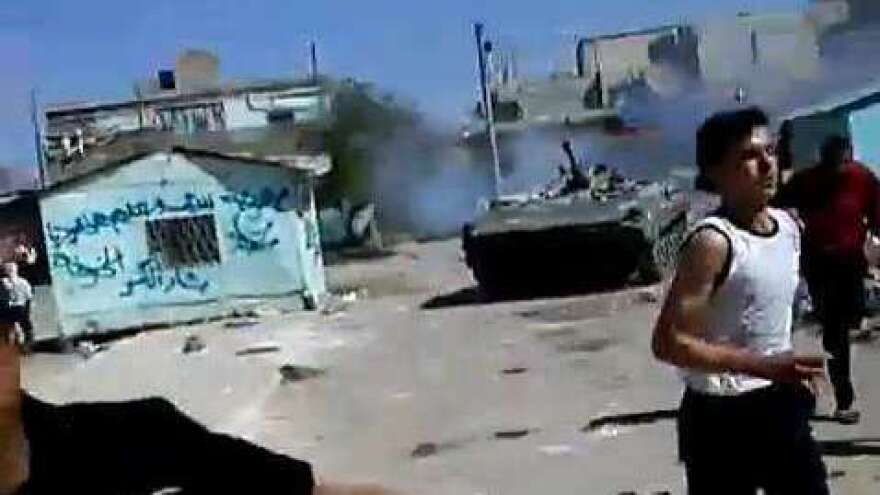Syria's President Bashar Assad has survived an uprising that's now in its eighth month, and he shows no signs of buckling. The president has relied on a massive security presence to limit protests at home, and has dismissed criticism and sanctions from abroad.
But is this strategy sustainable, or is Assad simply buying time?
In central Damascus, there are few signs of the country's turmoil. The courtyard of the massive Ommayed mosque, the largest in the city, is a peaceful place. Even the soldiers and security men, here to prevent any protest in the heart of the capital, seem relaxed.
Raneen Hassan, 22, is on an outing with her family and stops to feed pigeons that roost in the square. She is dismissive of those taking part in the protests.
"It's very good and quiet, and a very peaceful place," she says of the mosque.
When asked about the cities and villages outside the capital, where demonstrations are still common, if smaller than in previous months, Hassan say she is not impressed. These people are paid agents, she says.
"They are young people, young women, young men. So I don't give a damn about them," she said.
An official government escort is with me during an interview with a merchant, who insists there is no anti-government revolt at all. He says he is convinced by confessions he sees on state television. In these appearances, men allegedly involved in the uprising say they are from al-Qaida. And the merchant says he never watches the Western and Arab news networks that broadcast videos of peaceful protests, saying they are full of lies.

In a frame grab from a YouTube video, Syrian protesters clash with an armored military in the southern Syrian town of Dera'a last Friday, according to people in the video.
Despite the uprising that has left some 3,000 people dead, the regime can still count on this base of support, particularly in the capital and in Syria's economic center in Aleppo.
Pro-Assad rallies in Damascus and Aleppo this week, with tens of thousands participating, seemed designed to send a message of strength.
There have been some defections from the army, though the Syrian military and security forces are intact. The international community cannot agree on measures to halt the violent government crackdown. Syrian officials seem confident that the protests can be contained, according to sources who have regular contact with insiders.
"We are ending a period of confrontation between government and some demonstrators," says Waddah Abd Rabbo, editor of Al Watan, a pro-government daily.
He says the country is entering a new phase. "It's better to go through dialogue because nobody can win the battle in the street," Abd Rabbo says.
The relentless government campaign and mass arrests have taken a toll on the protest movement, and the government now seems confident it can contain the crisis, says human rights activist Wissam Tarif, who is in neighboring Lebanon.
"They are trying to manage the uprising, make it manageable by security forces, which in my personal view, they have done that in a lot of cities," he says. "But the big question is: Do they make it sustainable? It is management, it is not sustainable. And that is the real challenge."
Government Opponents Organizing
There is no way out of this without politics. Syria is still in a tunnel where there is no light seen until now.
While the street protests appear to be losing momentum, a new political landscape is emerging. For the first time in decades, political groups outside government control are beginning to assert themselves.
A coalition of dissidents has united outside the country. The Syrian National Council, announced in Istanbul, Turkey, brought together the Muslim Brotherhood with secular dissidents, as well as young leaders from the protest movement.
Inside Syria, other dissident groups are trying to win public support. At a news conference in Damascus, Dr. Abdul Aziz al-Kheyer, a former political prisoner, explains that there is no way out of the crisis without a political solution.
"There is no way out of this without politics," he says. "Syria is still in a tunnel where there is no light seen until now."
This is a dangerous time, Kheyer says. Protesters feel abandoned by the international community. There are increasing calls for armed rebellion. Now, the Arab League is pushing negotiations by the end of the month between the regime and the newly formed opposition. Kheyer fears the Syrian leadership will miss the chance by rejecting the offer.
"Most of those who hold power believe we don't need to talk to anyone — and we will kill whatever needs to be killed, and we will rule for a long, long time again," he says.
The protest movement, meanwhile, may not be as large as it was, but it is still aggressively challenging the regime. One recent YouTube video shows a group of men swarming around an armored Syrian military vehicle. Activists say they captured the gunner in the southern town of Dera'a.
Wissam Tarif, the human rights activist, says the regime's crackdown doesn't solve the problem, but only buys some time.
"The minute they pull the troops out, the minute they give the security forces less power, people will go out and protest again and again until Bashar al Assad and his regime crack and leave the country," he says.
Copyright 2020 NPR. To see more, visit https://www.npr.org. 9(MDA4MDYxNjY4MDEzMTQ2OTkxMzkyOWU2NQ004))




